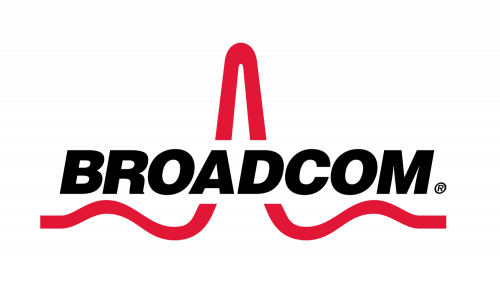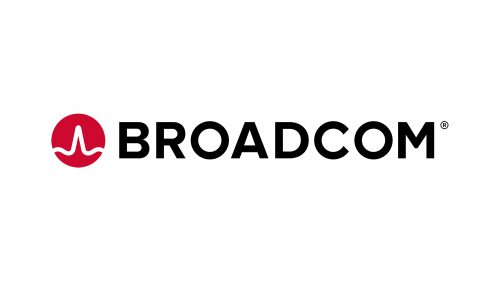Broadcom Corporation is a global technology company specializing in semiconductor and infrastructure software. The company was created by Henry Samueli and Henry Nicholas in 1991. The co-founders were a professor and a student from the University of California, Los Angeles (UCLA). The original name was Broadband Telecom.
Meaning and history
The Broadcom logo has always looked bright and dynamic due to the red color and the emblem based on the mathematical sinc function.
What is Broadcom
The fabless semiconductor company Broadcom became the property of Avago Technologies in 2016 and now is a wholly-owned subdivision of Broadom Inc. The brand debuted on the Fortune 500 list in 2009. In 2013, it was already ranked No 327. As of 2021, the company is ranked No 121 on the Fortune 500 list.
1991 – 2018
Initially, the firm was based in Westwood, Los Angeles, but in 1995 it relocated to Irvine, California. Three years later, another momentous event in the brand’s history took place: the company went public (it was traded on the NASDAQ exchange). By that time, the number of employees worldwide reached 11,750. They came from over 15 countries.
The earliest Broadcom logo reflected the original name, while later versions already featured the abbreviated version. However, they all were based on the same symbol inspired by the mathematical sinc function. According to a corporate legend, the author of the first logo was Stacey Nicholas, who was the wife of the co-founder Henry Nicholas back then. Stacey Nicholas used the sinc function deliberately, so it wasn’t but a mere coincidence.
We can only speculate about whether there was any symbolic connection between the mathematical sign with the company and its products. What is obvious, though, is that it has a dynamic shape, which adds motion to the logo. When colored red, it also becomes eye-catching.
So, even if the symbol isn’t very meaningful, it helps to create a recognizable and vibrant logo that captures the viewers’ attention and mirrors the company’s desire to embrace the future. In other words, the emblem seems to be rather effective.
The implied motion conveyed by the red wave is supported by the italicized type. The letters are utterly plain, but that is a wise choice because otherwise the logo would have been overloaded with details.
2018 – present
The logo was redrawn by Eliot Hochberg. On the one hand, the new version was based on the brand’s visual heritage. On the other hand, a lot of things were modified.
For one, the emblem wasn’t merged with the wordmark anymore but was moved to the right. This time, the sinc function became white. The red color was preserved – it was now used for the circle inside of which the symbol was placed. The overall size of the emblem became far smaller – it was now only slightly higher than the letters in the wordmark.
The wordmark became lighter. The glyphs were also straightened and were made a bit wider. For instance, the “o’s” were circles now, not ellipses, like in the previous version. The shape of the glyphs remained classic, but there were also subtle updates here and there. For instance, the right “leg” of the “R” isn’t curved anymore but is a straight line, while the middle of the “M” is higher.
While the 2018 logo might be a little better legible, it is less dynamic than its predecessor. This results partly from the smaller emblem that was “caught” inside a circle and partly from the straightened glyphs.
Colors and font
The combination of red, black, and white is somewhat generic, yet it is vibrant and catches your eye.
Legibility is the main virtue of the font used in the Broadcom logo. It conveys stability and good quality, due to its functional shapes.










